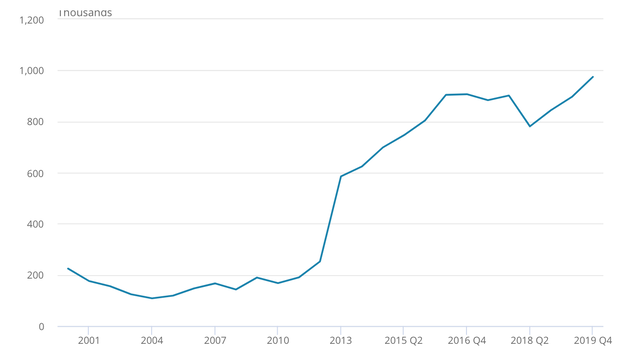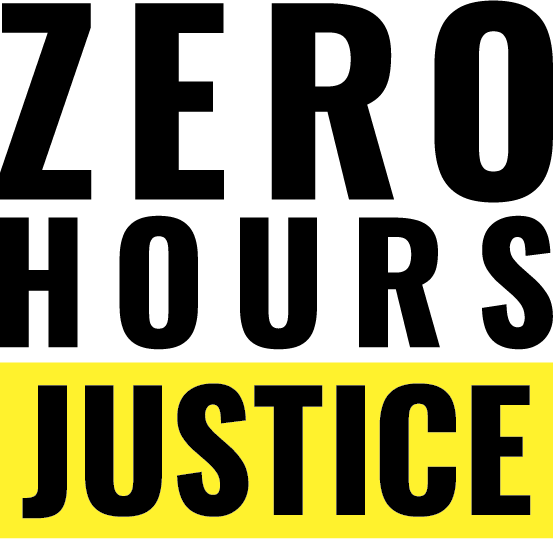|
By Pravin Jeyaraj and James Johnson-Flint According to the latest figures from Office for National Statistics, the number of people employed on zero hours contracts has risen to an all-time high of 974,000 – almost 1 million – in Quarter 4 2019. This is a shocking increase of 130,000 from Quarter 4 2018 - over 15% higher in just one year and now equivalent to 3% of all people in employment. Whilst the use of zero hours contracts has spread to all parts of society, there are particular groups which are more significantly affected, especially the lowest paid and most vulnerable who have little or no choice but to take the work offered.
The data also shows a correlation between zero hours contracts and part time employment. Of those employed on zero hours contracts, 67% are part-time workers. The reduced hours – and hence pay – that comes with part time work are compounded by the uncertainty of available work that all so often comes with zero hours contracts. Indeed, over 25% of all people on zero hours contracts say they want more hours, quite the opposite of (and some 3 times more than) those not on zero hours contracts. The pain endured by those on a zero hours contract unilaterally is also evident by the fact that average weekly hours for those on zero hours contracts has fallen to 23.6 hours, compared to 36.3 hours for everyone in employment. Ian Hodson, President of Zero Hours Justice, commented: “These latest statistics show just how badly zero hours contracts affect pay and society. Those on zero hours contracts are amongst the most vulnerable in our land. Many of them feel powerless to complain, even if they suffer serious problems at work like bullying and sexual harassment. The response from managers can be threats to cut their hours of work. But they simply can’t afford to lose any pay, so what can they do? Lots of landlords won’t take you if you are on a zero hours contract. And of course, you can’t get a mortgage. So, we have members who have been forced to live in places that are unfit for habitation and dangerous to their health. Nobody should have to live like that in 21st Century Britain. Every job should give people the basic security they need to live a decent life.” Over 40% of those employed on zero hours contracts are in the health and social care, accommodation and food sectors, with 31% employed in elementary occupations, 20% employed in care, leisure and service occupations .and 11.3% employed in professional occupations. About Zero Hours Justice Zero Hours Justice is a campaign led by a coalition of concerned citizens working together, with representatives from the TUC and responsible employers. The campaign was founded and funded by Julian Richer, entrepreneur, author of "The Ethical Capitalist" and avid campaigner for responsible capitalism. It is also supported by employment law specialists, Thompsons Solicitors. The aims of Zero Hours Justice are
Julian Richer commented: “This is an apolitical campaign for those who want a better society. We want our campaign to be a coming together of interested parties to end the awful practice of zero hours contracts. As an employer, I care passionately about my colleagues. I can’t imagine anything more likely to cause misery than not knowing day-to-day whether they will have enough money for food or rent. Maybe such contracts can work for a small minority of workers who have other significant household incomes or for students with wealthy parents, but for the vast majority this evil way of exploiting people at work must be banned – as indeed they are in the great majority of European countries. If we can’t give working people basic security, we should be ashamed.” James Bloodworth, Author of “Hired: Six Months Undercover in Low-Wage Britain”, commented: "I worked in several zero hours contract jobs as part of the research for my book and it was striking to me the level of insecurity zero hours contracts created among workers who were already having to cope with low-pay and brutal employment conditions. Not knowing from week to week how many hours you would be given by your employer added another layer of precarity to jobs that were already in many instances done by people who were struggling financially. “Furthermore, Government policy when it comes to the benefits system has made life harder for those on zero hours contracts. Should a worker leave a job of their own volition, they are not entitled to claim jobseekers’ allowance. This leaves many workers trapped in jobs in which they are not being given enough hours each week to make ends meet. This in turn is generating a big increase in in-work poverty and food bank use. Employed on a zero hours contract, a worker may be working as little as five hours a week – yet still he or she may be unable to get another job or leave and claim jobseekers’ allowance while they look for something full time. It's nothing but cruel and I lend my support to Zero Hours Justice to help in any way I can." Comments are closed.
|
contactFor press enquiries or permission to reuse content, please contact: Archives
June 2024
CATEGORIES
All
|
|
Company No: 12417909 Registered Office: 38 Coney Street, York, Y01 9ND
|


 RSS Feed
RSS Feed


